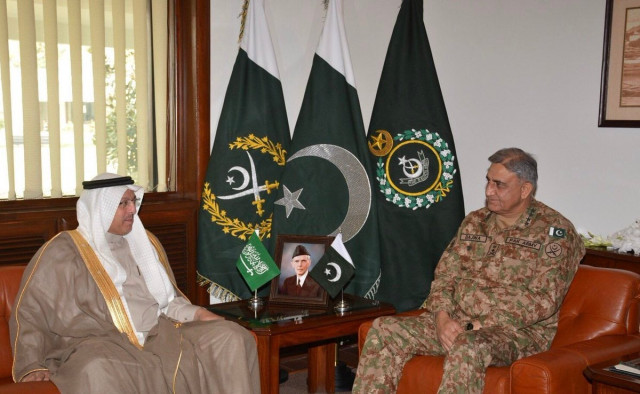A tough call
Is there not this sectarian tinge in this military alliance given the 100 per cent Sunni dominance of the countries?

Army chief Gen Qamar Bajwa meets Saudi ambassador at the GHQ on Friday. PHOTO: ISPR

Gen Bajwa, who became the army chief in November, last year, had gone on a three-day official visit to Saudi Arabia in December. In his meeting with Saudi deputy crown prince and defence minister Muhammad bin Salman, the army chief had “reiterated Pakistan’s commitment to the security and protection of the holy mosques and also the territorial integrity of the kingdom”. The army chief had also called on Saudi King Salman bin Abdul Aziz Al Saud. They acknowledged that both Pakistan and Saudi Arabia were vital players in regional stability “with significant responsibility towards the entire Muslim ummah”. The Saudi king and Gen Bawja emphasised the need to continue working to eliminate the menace of terrorism and reinforce the mechanism to roll back extremism with even greater vigour. He had also met Chief of General Staff of Saudi Forces Gen Abdul Rehman bin Saleh Al Bunyan and discussed military-to-military relations, defence cooperation and regional security situation. Pakistan and Saudi Arabia enjoy a longstanding relationship particularly in the field of defence. However, their ties saw an unprecedented hiccup last year when parliament refused to allow Pakistani troops to join the Saudi-led offensive in Yemen against the Houthi rebels. And recently, when reports to the effect that our former COAS Gen (retd) Raheel Shareef had been offered the job of leading the joint forces of 34 Muslim countries put together by KSA and that he had accepted the offer were being put out by our media, one could feel a national surge against the possibility for more than one reason. The question was would this not affect our ‘policy of neutrality’ towards Saudi Arabia and Iran given that all 34 members of the coalition are Sunni majority nations? Is there not this sectarian tinge in this military alliance given the 100 per cent Sunni dominance of the countries that constitute the alliance? The stated primary objective of the joint force is “to protect the Muslim countries from all terrorist groups and terrorist organisations” but would this be possible with Iran, Iraq and Syria not being part of this coalition but are the very countries that are at the centre of all conflicts that affect the entire Arab World. The alliance is also expected to deploy military forces in Syria to fight the IS. As is being felt universally in Pakistan such a development would be a great military mistake.
Published in The Express Tribune, January 23rd, 2017.
Like Opinion & Editorial on Facebook, follow @ETOpEd on Twitter to receive all updates on all our daily pieces.














COMMENTS
Comments are moderated and generally will be posted if they are on-topic and not abusive.
For more information, please see our Comments FAQ